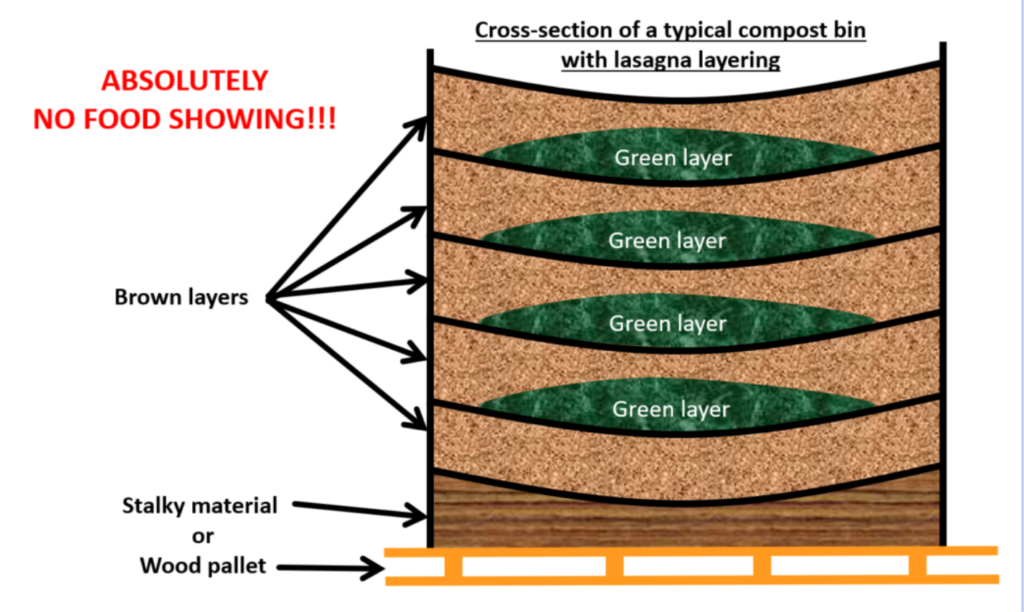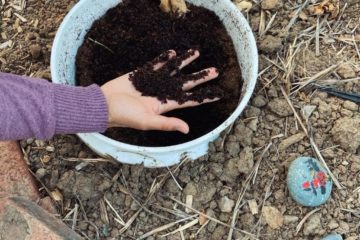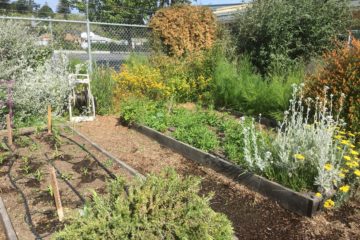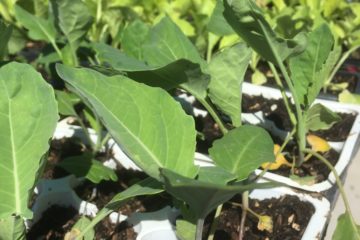Written by Clare Carlson, Grant Writing & Development
If you are looking for a simple way to repurpose your food waste and live more sustainably, composting is a great start! Compost is made from organic wastes (like kitchen scraps, paper, and yard clippings) and is a good way to recycle while creating a valuable byproduct that feeds plants and promotes healthy garden growth (Carr). Through the process of composting, microorganisms feed on scraps of organic waste and break them down, releasing valuable plant nutrients that are beneficial for gardens and the environment as a whole.
Benefits to using compost in your garden
- Compost increases nutrient content
- As organic material decomposes in a compost pile, it will begin to produce something called the soil food– which is a great fertilizer (Mazzoni). This soil food web is a community of organisms that live in the soil and improve crop yields by introducing vital nutrients into your garden.
- Defends against plant diseases
- The organisms that live in the previously mentioned soil food web decompose organic compounds (such as manure, plant residue, and pesticides) which prevents these compounds from entering the water and becoming pollutants to the plants in your garden.
- Improves soil structure
- Adding compost to your garden helps to neutralize the pH of the soil and increase the soils’ ability to hold nutrients for plants to use (Mazzoni). Adding compost has immediate and long-term positive impacts for your garden because it adds proteins to your soil which binds soil particles together, allowing the soil to resist compaction and increase its ability to hold moisture and nutrients (Mazzoni).
- Less water consumption in your garden
- Because fertile soil has greater moisture retention, you can use less water in your garden. With the organic matter from compost, heavy soils are better equipped to hold water and resist compaction which also reduces erosion and runoff (Mazzoni). EPA data found that soil can retain 16,000 more gallons of water per acre for 1% of organic material, so adding compost to your garden is clearly beneficial to the overall sustainability of the garden.
How to compost
There is no one right way to compost so it is important to find the best method for you, your living space, and your lifestyle.
- Open pile: This method works if you have some land and low proximity to neighbors because the pile is open and does not trap scents. Moreover, open piles are managed less so pests and foul odors can occur.
- Bin: A compost bin is a great option for apartment or neighborhood living. You can build your own bin from welded wire, wood pallets, chicken wire, cinder blocks, drums and trash cans. You could also purchase a pre-made bin at your local gardening store or online. It is recommended that you elevate your bin on a wooden pallet or line the bottom with stalky material to increase airflow and drainage.
Preparing scraps for the pile
- Keep a container in the kitchen to collect scraps, when the container is full empty it into your pile. Avoid sealing the container as this can lead to foul odors, instead partially seal the container or cover it with a cloth to keep odors in and fruit flies out.
- Cutting, chopping, and crunching food scraps will increase their surface area, accelerating decomposition. But, too much cutting creates excessive moisture, so it is best to have a variety of sizes of scraps.
Building and managing the pile
- “Lasagna layering” is a popular method for layering a compost bin, the graphic below illustrates how a compost bin should look using this method.

Items you CAN compost
- Greens: most food waste, coffee grounds and filters, vegetables and fruits, egg shells, manures, grass
- Browns: soiled napkins and paper plates, newspaper, leaves and straw, wood chips, yard debris
Items you CANNOT compost
- Plastic, glass, metal, styrofoam
- Meat, dairy, oily products, fatty products can be composted BUT they risk attracting pests and causing odors if not managed properly (compost them only if you’re experienced)
Sources:
Carr, Rick. “Backyard Composting Basics”. Rodale Institute, 4 Jan 2019. https://rodaleinstitute.org/blog/backyard-composting-basics-a-cheatsheet/.
Mazzoni, Mary. “The Benefits of Using Compost in Your Garden”. Earth911, 13 March 2013. https://earth911.com/home-garden/garden-compost-benefits/.



0 Comments